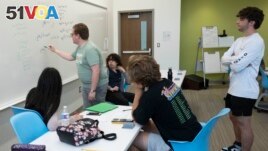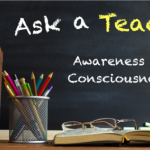16 September 2023
"This is a huge issue," said one college math professor.
"This is significant and deep," said another.
They were talking about their students who are still struggling with basic math skills three years after the start of the COVID-19 pandemic.

George Mason undergraduate math major David Wigginton writes an equation on a whiteboard as students Ethan Hill, right, and Diego Fonseca, center, take part in a summer math boot camp on Thursday, Aug. 1, 2023 at George Mason University in Fairfax. Va. (AP Photo/Kevin Wolf)
Most of the students are in their first or second year in college. But when the pandemic started in 2020, they were still in high school, learning algebra or early calculus.
During the pandemic, many U.S. schools closed to in-person classes and started teaching by video call. Education experts said they believed students would catch up.
College professors said they hoped for a "rebound" by now. But it has not happened in most places.
As a result, universities in the U.S. are trying to find ways to fix the problem. Some offer summer math camps. Others called on students to learn from each other, a process known as "peer tutoring." Still others offer basic math classes students can take while also attending classes such as calculus.
Brian Rider is the head of the math program at Temple University near Philadelphia, Pennsylvania.
"It's not that they're unprepared," he said. "They're almost damaged."
Rider said he hated to say that, but "they're so behind."
One teacher's experience
Erin Vorke is a math instructor at Eastern Florida State College. Many of her students must take a math class to get a two-year associate degree and move on to a four-year college. Some are high school students who are getting college credit. She told VOA about her experience.
She said some of her students did not get a good foundation in math even before the pandemic started. Once they missed time in class, their troubles increased.
"It's definitely become a lot worse since the pandemic. And what I've been told is that everyone was just being passed through while they were in high school...I have a lot of students who can't work with negative numbers, I have students who don't know what an even number is."
Vorke said she cannot stop her class to teach students something they should have learned when they were in middle school.
"I slow down as much as I can, but I have to cover my curriculum," she said.
Students struggling
Diego Fonseca is a student in northern Virginia, just outside of Washington, D.C. Nineteen-year-old Fonseca recently finished high school. This summer, he took a math "boot camp" at George Mason University so he could "brush-up" on math learning. He was one of about 100 students trying to improve their math skills.
He said he did well in physics and computer science while in high school, but he did not get good scores on a math placement test for college. He wanted to take calculus, but in three tries on the test, he did not get a good enough score. He was permitted to take the test four times and wanted to do better on his final attempt.
He was not having trouble with the math he learned recently, but he did not learn algebra well early in high school when schools closed in 2020.
"I didn't have a hands-on, in-person class," Fonseca said. He later said he had trouble with more difficult algebra.
The math troubles are a problem for students at universities across the U.S. who want to study engineering and science. Many are being placed into low math classes, which means they are falling behind in their study programs.
Colleges say the pandemic learning problems affected both reading and math, but math skills suffered more, and recovery has been slow.
Maria Emelianenko is one of the math professors at George Mason. She said students are in difficult pre-calculus and calculus classes and they cannot add simple fractions.
Jessica Babcock is a math professor at Temple. She said she realized how big of a problem she had while grading a test last year. Nearly all her students missed what she thought was a simple question.
"It was a striking moment," she said.
Babcock teaches a basic math class that includes material students should have learned in their first year of high school. Before the pandemic, it had about 800 students. But by 2021 there were almost 1,400.
Education researchers say math is a "hands-on" subject and it was hard to teach with students learning from home. If students moved on to subjects like geometry or trigonometry without learning algebra, learning gaps could go unnoticed for years. In addition, they say parents have an easier time helping their children with reading than math at home.
'Many students gave up on math'
Katherine Strunk is an education expert who now heads the graduate school of education at the University of Pennsylvania. She led a study that looked at learning problems in Michigan.
She said minority students and low-income students had the most problems during the pandemic.
"They're the ones who are going to suffer the longer-term consequences," she said.
Babcock, the Temple professor, said many students gave up on math. They did not come for help and continued getting poor grades on tests.
The problems made Babcock change her class this year. The class has discussions, making students more involved in the learning process.
"We really want students to feel like they're part of their learning," Babcock said.
That kind of class, said Vorke, may be more helpful for students who wonder when they will use algebra or other math in the future. She is part of a group of educators at her college who teach what she called "real-world problems (students) can actually relate to," each summer.
"If you go shopping, and there's a sale, and you want to figure out how much you'll be paying for an item that's 10 percent off. That's algebra," Vorke said.
After the summer boot camp, Fonseca said he chose to start his college studies at Northern Virginia Community College. In two years, he can move on to George Mason. He recently took the placement test again. On his final attempt, he qualified for calculus.
"I didn't have any expectation I'd do that," he said.
I'm Dan Friedell. And I'm Jill Robbins.
Dan Friedell adapted this story for Learning English based on a report by The Associated Press and his own reporting.
___
Words in This Story
significant –adj. important in some way
basic –adj. simple and low-level
rebound –n. a return to an earlier, better condition
foundation –n. the base on which later learning is built
negative –adj. less than zero
even –adj. a multiple of two
curriculum –n. the classes that are part of a school study program
boot camp –n. an intensive training program aimed at getting students to become much better in a short period of time
brush up –v. to improve skills or knowledge usually some time after learning them
fraction –n. non-whole numbers that are expressed as division of one whole number into another
hands-on –adj. involving actually doing something rather than reading or thinking about it
consequences –n. (usually pl.) the results of words or actions











